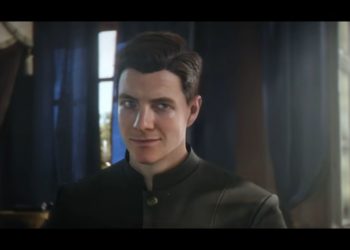With 90 minutes to go before curtain, a group of stagehands rushed to repair a broken door on the set of Verdi’s “Macbeth” at the Grosses Festspielhaus in Salzburg, Austria. In a costume shop next door, workers combed and curled a line of unruly wigs. Lining a plaza outside, men in tuxedos and women in dirndls gathered to sip schnapps and Champagne.
It was a typical August evening at the Salzburg Festival, which every summer becomes the center of the classical music world, cramming more than 200 opera, concert and theater performances — roughly the equivalent of Carnegie Hall’s entire season — into six weeks. It is a mammoth undertaking that involves about 3,500 artists; 1,000 staff members; 16 stages; and a budget of 75 million euros (about $88 million). This summer alone, there were six staged operas and four plays, featuring more than 1,500 costumes, including leopard-print hats and glittering Swarovski-covered masks.
“There’s no room for error,” said Georg Schlager, a stage manager overseeing repairs on the “Macbeth” set, which would be torn down in the wee hours to make room for an orchestral rehearsal the next morning. “We want every detail to be perfect.”
No summer festival is quite like the one in Salzburg, a city of around 150,000 at the foot of the Austrian Alps that was the birthplace of Mozart and the bucolic backdrop for “The Sound of Music.” Here, the offerings are rich and abundant — Mozart symphonies at 10 a.m., vocal recitals at 10 p.m. — drawing more than 256,000 visitors from around the world, including more than 500 journalists.
The renowned Vienna Philharmonic is the house band, performing concerts and playing in the pit for operas (the orchestra appeared in Salzburg 29 times this summer). Veterans like the mezzo-soprano Cecilia Bartoli sing alongside rising stars like the mezzo Lea Desandre. On a single day in August, three of the world’s leading maestros — Daniel Barenboim, Riccardo Muti and Esa-Pekka Salonen — were in town, conducting Beethoven, Bruckner and Schoenberg.
“You come here and you step into this musical kingdom in the mountains,” said the pianist Lang Lang, who was making his 16th appearance at the festival. “Today might not be the golden age for classical music. But in Salzburg, it always feels that way.”
Visitors pack restaurants to sample Salzburger Nockerl, a soufflé shaped like the surrounding mountains, and young musicians from nearby conservatories perform Bach suites and Paganini caprices on street corners.
Horse-drawn carriages shepherd concertgoers down centuries-old alleys and past the stately mustard-colored home where Mozart was born. Nearly 270 years later, his visage is everywhere in Salzburg, on lighters, spatulas, thongs, perfume bottles and the ubiquitous Mozartkugeln, pistachio marzipan sweets that are a cherished Austrian export.
Salzburg’s Old Town fills with so many artists during the summer that it’s not unusual to bump into a top soloist or an acclaimed maestro in line at a pretzel stand or a cafe.
“It can sometimes feel a little claustrophobic,” said Salonen, over an espresso one August afternoon. “But it’s nice to have this kind of density because it creates a certain type of energy.”
Agents, publicists and impresarios flock to Salzburg too, making deals and scouting talent.
Peter Gelb, the general manager of the Metropolitan Opera in New York, who has been visiting Salzburg since the 1970s, held 10 meetings over three days this summer, working out of the Goldener Hirsch hotel in the Old Town.
“It’s like the Cannes of classical music,” he said. “It’s an opportunity to do business on the sidelines, and to see work that I haven’t seen. Even though I don’t think the productions are quite as interesting as they used to be, Salzburg remains one of the most important festivals.”
A Singer’s ‘Energy Place’
The soprano Asmik Grigorian was in a hurry. It was opening night of “Macbeth,” and she had just received a spirited ovation for her portrayal of Lady Macbeth. Now she was in her dressing room, getting ready for a late-night cast party at a rococo palace.
As she refreshed her makeup and put on a tiara, Grigorian, 44, one of the most in-demand singers of her generation, recalled her 2017 debut in Salzburg in Alban Berg’s “Wozzeck,” an electrifying performance that helped propel her career.
“This is a place where an opera singer can really feel like a star,” she said. “Sometimes we need this.”
Grigorian, who is from Lithuania, has returned to Salzburg every summer since that debut; her young son and daughter have had to celebrate many of their birthdays there.
“Salzburg has somehow become my hometown,” she said. “This is my energy place.”
She put on her lipstick. “I always joke that if I can survive Salzburg,” she said, “I will live for another year.”
Hunting for an Autograph
After the curtain came down on “Macbeth,” Benny Bertram, a 12-year-old aspiring singer from Salzburg, rushed to a stage door with his mother. He was hoping to score an autograph from the baritone Vladislav Sulimsky, who sang the title role — the only “Macbeth” cast member whose signature he didn’t have.
When Sulimsky emerged a few minutes later in a brown suit, Benny was elated, running toward him and waving his arms.
“I’m happy, very happy,” he said, holding up the photo that Sulimsky had signed. “Now it feels complete.”
His mother, Nicole Bertram, a German-born singer who moved to Salzburg for her musical studies, surveyed the dressy opening-night crowd in front of the Grosses Festspielhaus.
“Everybody looks like Greta Garbo,” she said.
Salzburg is best, she added, in the fall and winter, when the streets are more still.
“It’s too hot and there are too many people,” she said of the summer. “I love it when it’s silent.”
‘Father’ of the Orchestra
The conductor Riccardo Muti stood before the musicians of the Vienna Philharmonic and smiled.
“Buongiorno,” he said. “It’s nice to be together again.”
Muti, 84, was leading a rehearsal of Bruckner and Schubert at the Grosses Festspielhaus on a Tuesday morning. He had performed with the ensemble more than 500 times, beginning with his debut at the Salzburg Festival in 1971, when he led Donizetti’s “Don Pasquale.”
Back then, he was a 30-year-old novice, terrified of the Vienna Philharmonic’s stern and exacting players, and towering figures like the conductor Herbert von Karajan, who roamed the streets of Salzburg.
“I couldn’t sleep for nights and nights thinking that I had to meet the Vienna Philharmonic,” he recalled in an interview. “Now Salzburg is much more modern. But then, it was sort of a temple.”
At the rehearsal, Muti, the former music director of the Chicago Symphony, told the orchestra to play a bit of Bruckner “with pain,” and warned that a phrase would “be a mess” if the orchestra and chorus were not more balanced.
“Don’t exaggerate,” he told the players. “Do it always with taste.”
As he made his way to his dressing room, Muti stopped to chat with musicians, reminding them to eat well.
“When I started with them, I was a child — a son of the orchestra,” he said. “Now I am much older than all the players. I am the father.”
‘My Nirvana’
Backstage at the Grosses Festspielhaus on a Friday, the pianist Lang Lang was in good spirits. He was appearing that evening with his mentor, Barenboim, the eminent conductor and pianist, as part of their European tour with the West-Eastern Divan Orchestra, which Barenboim helped found in 1999 to bring Israeli and Arab musicians together.
Rehearsing a Mendelssohn concerto, Barenboim, 82, a fixture at the festival for decades, had been as candid as ever, offering his protégé notes on tempo, phrasing and dynamics. With a Chopin mazurka, he gave advice on rhythm.
“It’s back to the master class,” Lang said. “No messing around.”
On the tour, Lang said, he had made a point of reminding Barenboim, who has continued to perform despite a recent diagnosis of Parkinson’s disease, to take time to rest. But Barenboim would have none of it. Lang suggested they party instead.
At intermission, the Steinway concert grand that Lang played was loaded onto a trolley and whisked through the streets to another concert hall for a recital the next day.
Outside the Grosses Festspielhaus, the piano passed by Sonja Klein, 78, a retired teacher from Germany. She trailed the instrument, snapping photos as it passed a garden and a restaurant called Triangel, a post-performance haunt for artists.
Klein makes the pilgrimage to Salzburg every summer. During a four-day trip in August, she planned to attend three operas; two concerts; and a play, “Jedermann,” an annual Salzburg tradition. She rates each performance in a notebook, drawing stars next to her favorite artists.
Klein said she often fretted about classical music’s future. But in Salzburg, she said, she felt energized.
“Where else in the world can you have such a feast?” she said. “This is my nirvana. This is my heaven.”
‘It’s Here, and Then It’s Gone’
It was one of the busiest weeks of the summer, and Markus Hinterhäuser, the festival’s artistic director, was in his office, smoking a Chesterfield cigarette. He had long given up on sleep.
“There is a kind of energy in me which allows me to have really remarkable non-sleep,” he said.
Salzburg does not shy away from modern themes (this year, Handel’s “Giulio Cesare in Egitto” was set in an air raid shelter). Hinterhäuser said the festival, founded in 1920, did not want to coddle its audiences, which include the wealthy and well connected. (Angela Merkel, the former German chancellor, is a regular.)
“This is not a spa resort for culture,” Hinterhäuser said. “The greatest respect you can give an audience is to challenge them in an honest way.”
The festival also faces challenges. Costs are rising, and it has drawn criticism recently for its lack of female conductors and directors, though it has worked to increase diversity. Since the invasion of Ukraine, the festival has faced scrutiny for hosting artists with ties to state-owned institutions in Russia, including the conductor Teodor Currentzis, who led several performances this summer.
Some complain that the festival is still too inaccessible. While some tickets can be bought for 5 euros, or about $6, the best seats go for 475 euros, or about $555. (Performances typically sell out; this summer, about 98 percent of seats were occupied.)
“We want the best of the best in our audiences,” said Kristina Hammer, the festival’s president. “But it should not have anything to do with how much money you have — it’s about how much you understand music.”
These days, the festival is focused on its next chapter: a 480 million euro (about $562 million) construction project over the next seven years that includes a new welcome center and a vast expansion of backstage facilities. The festival will create 9,000 square meters (about two acres) of space by drilling into the adjacent Mönchsberg mountain. The project is being led by the festival’s executive director, Lukas Crepaz, along with Hammer and Hinterhäuser.
In his office, Hinterhäuser said he was concentrating on getting through the summer.
“It’s completely ephemeral what we’re doing,” he said. “It’s here, and then it’s gone. It’s very melancholic, but there’s also an incredible beauty.”
Javier C. Hernández is a Times reporter who covers classical music, opera and dance in New York City and beyond.
The post The Cultural Kingdom Where Classical Music Still Reigns appeared first on New York Times.




